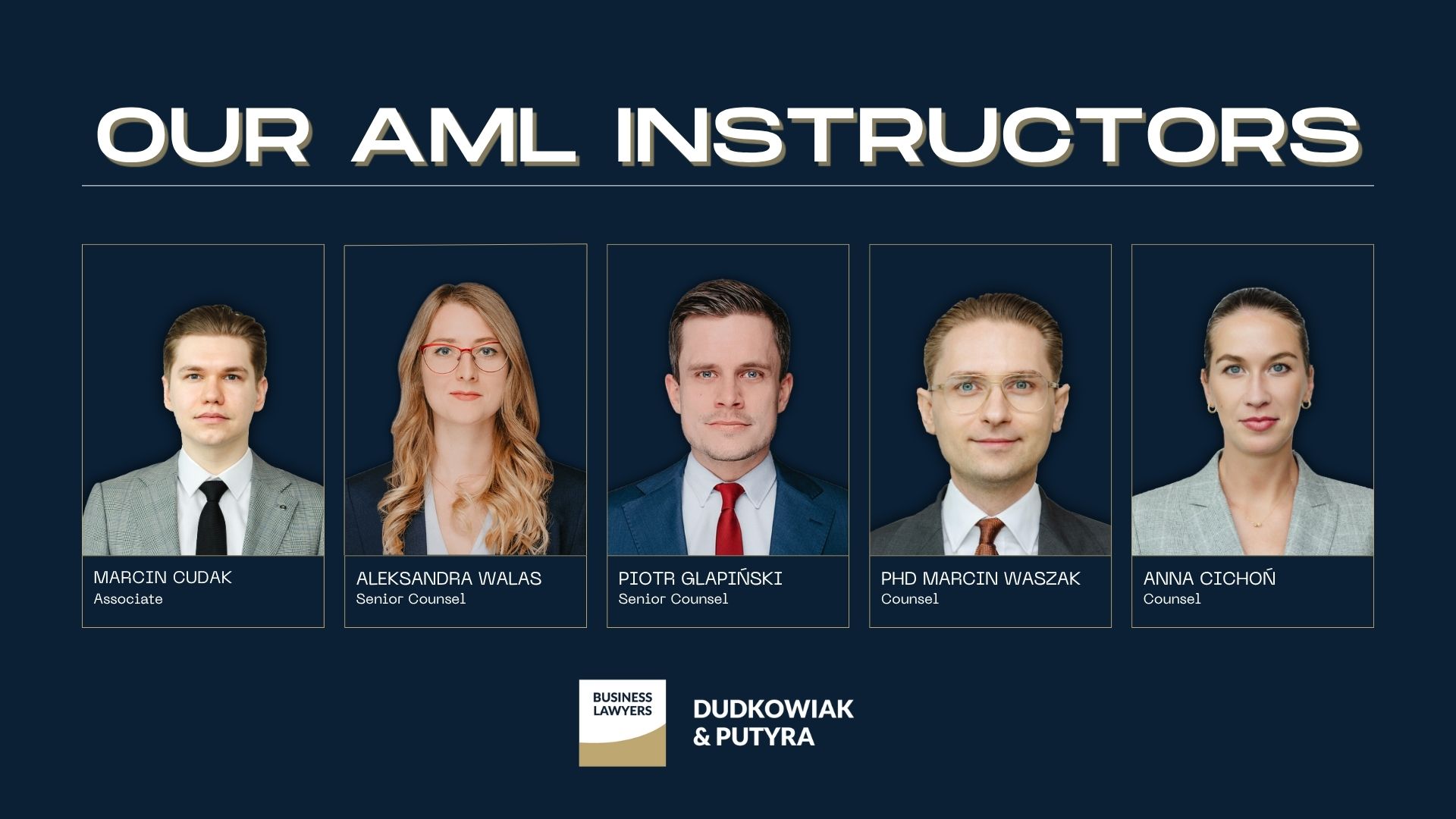AML training in Poland
Ensure Compliance, Protect Your Business



In the rapidly evolving landscape of financial regulations, maintaining compliance with Anti-Money Laundering (AML) laws is not just a legal obligation, but a critical component of protecting your business.
At Dudkowiak Kopeć Putyra, we offer a comprehensive AML training program, designed to equip professionals in financial services with the knowledge and practical tools necessary to identify, manage, and mitigate money laundering risks.
Welcome to Our Anti Money Laundering Training Program!
Our program is specifically designed for professionals in industries most susceptible to money laundering threats, such as Virtual Asset Service Providers (VASPs and CASPs) and Payment Institutions (SPI, API, EMI). With expert instructors and a meticulously developed curriculum, we help you meet and exceed regulatory requirements while protecting your organization from potential liabilities.
Anti money laundering training equips financial services companies with the knowledge and skills necessary to comply with regulatory requirements and effectively combat money laundering and terrorist financing. Enhance your compliance knowledge and earn a certificate that validates your expertise.

Why Enroll in Our anti money laundering training?
In the intricate field of finance, financial institutions must adhere to AML regulations to combat financial crime. Our training equips you with the essential knowledge and tools to mitigate money laundering risks and comply with regulatory requirements.
1. Comprehensive Curriculum
Our program offers a detailed coverage of anti money laundering laws, AML essentials, and advanced regulatory topics, ensuring you are well-prepared to tackle the complexities of AML compliance.
2. Customized Training for Your Industry’s AML Compliance
Our AML training is tailored to meet the specific needs of your sector and protect the financial system. Whether you are in banking, fintech, payment services, or any other industry subject to AML regulations, our program will address your unique challenges and requirements.
3. Expert Instructors
Training is led by seasoned professionals with extensive legal and industry experience, providing you with insights from experts who understand the practicalities of AML enforcement.
4. Anti Money Laundering Certificate
Earn a prestigious AML Certificate that verifies your expertise and enhances your professional credibility.
In the complex world of financial regulations, staying compliant with Anti-Money Laundering (AML) laws is crucial. Our specialized money laundering training helps professionals from different sectors understand and implement AML practices effectively.
Enroll now to ensure your organization meets regulatory standards and mitigates the risks associated with money laundering. Our programs also address money laundering by incorporating international legal frameworks and regulations, highlighting the global effort required to combat these activities.
Training Duration and price
Our 1 day Anti-Money Laundering (AML) training session equips financial institutions with essential knowledge to prevent money laundering and combat financial crime. You’ll gain an in-depth understanding of:
- Money laundering and terrorist financing basics, including criminal proceeds, and the role of financial institutions in identifying illicit funds and suspicious transactions.
- Key AML regulations such as the Bank Secrecy Act, focusing on suspicious activity reports (SARs) and reporting suspicious transactions.
- Practical techniques for customer due diligence (CDD), identifying red flags, and complying with AML laws.
- Compliance challenges for VASPs and businesses, including MiCA and Travel Rule.
Stay compliant and protect your institution from illicit activity while supporting law enforcement efforts to fight financial crime.
Price for training: 1.000 EUR net
Training Agenda
Our AML training curriculum is meticulously structured to provide a thorough understanding of AML compliance:
- Fundamentals of Money Laundering and Terrorism Financing: Core definitions and concepts.
- Regulatory Landscape: Overview of AML regulations and compliance requirements.
- Bank Secrecy Act and Financial Crimes Enforcement Network: Key regulations governing the use of cryptocurrencies and anti-money laundering efforts in the U.S., including compliance requirements for financial institutions to monitor and report suspicious activities.
- Obligations of Institutions: Roles and responsibilities under AML regulations.
- Special Focus on VASPs: Compliance requirements for Virtual Asset Service Providers.
- AML Regulatory Authority: Understanding the role of the AML regulator.
- Identifying Responsible Persons: Key roles and their responsibilities.
- Managing Business Relations and Transactions: Best practices for AML compliance.
- Risk-Based Approach: Implementing effective risk management strategies.
- Conducting Risk Assessments: Practical techniques for assessing risks.
- Establishing Internal Procedures: Setting up robust AML compliance protocols.
- Anonymous Reporting Mechanisms: Encouraging and managing whistleblowing.
- Financial Security Measures: Ensuring comprehensive transaction security.
- Identifying Beneficial Owners: Procedures for identification and verification.
- Handling Politically Exposed Persons (PEPs): Managing high-risk clients.
- Applying Restrictive Measures: Implementation of sanctions and restrictions.
- Reporting Obligations: Efficient processes for reporting to authorities.
- Compliance Responsibilities: Legal implications and penalties for non-compliance.
- Data Protection: Safeguarding personal and sensitive information.
- Sector-Specific AML Issues for VASPs:
- VASP Registration
- Forthcoming regulations (MiCA, Travel Rule)
- Identifying red flag indicators
- Interactive Q&A Session: Addressing participant queries in real-time.
Certification
Participants who successfully complete the training will receive a certified AML Certificate, enhancing your professional standing and validating your expertise and knowledge in AML compliance. This certification will not only enhance your organization’s credibility, but also strengthens your role in protecting the global financial system.
Don’t Wait – Take the Step Toward Preventing Money Laundering Today!

Our Instructors
Alicja Mruczkiewicz | Barrister at law
Alicja is a distinguished legal expert with a robust background in anti money laundering laws. She has played a pivotal role in creating effective AML frameworks for various organizations.
Alicja’s deep understanding of both legal and technological aspects ensures that our training is not only comprehensive but also highly relevant to real-world applications.
Her extensive experience and practical insights make her an exceptional instructor, empowering you with the knowledge and skills needed to excel in AML compliance.
Aleksandra Walas | Attorney, Senior Counsel
Aleksandra is an expert in AML/CFT with extensive experience in drafting internal procedures and advising on risk management. A graduate of Adam Mickiewicz University, with advanced studies in compliance and leadership, she has successfully represented clients in complex account blockages and ensured compliance with Polish and EU regulations.
She also advises in the FinTech and payment services sectors, guiding clients through licensing processes with the Polish Financial Supervision Authority. Her practical insights and comprehensive knowledge make her an exceptional instructor in AML compliance.
Piotr Glapiński | Attorney, Senior Counsel
Piotr Glapiński is a highly experienced attorney specializing in AML compliance, payment services law, and regulatory matters. He has advised numerous financial institutions, including payment and e-money institutions, in licensing processes before the Polish Financial Supervision Authority (KNF).
With extensive experience in AML/CFT projects, including KYC/KYB and ID outsourcing, Piotr ensures compliance with both Polish and EU regulations. His deep understanding of risk management and regulatory frameworks makes him an essential expert for effective AML training.
PhD Marcin Waszak | Attorney, Counsel
PhD Marcin Waszak, a regulatory expert with a PhD in law, specializes in compliance for the gambling and fintech sectors. With deep knowledge of AML/CFT regulations, he offers targeted training and practical insights for businesses navigating complex compliance requirements.
His experience in navigating legal intricacies across multiple industries and fluency in English ensures he delivers high-quality anti money laundering training and support for clients facing regulatory challenges.
Ania Cichoń | Counsel
With a strong background in regulatory compliance, Anna Cichoń offers a unique perspective to AML training, drawing from her extensive experience in industries like energy, environmental law, and gambling law.
Her ability to understand and apply complex legal frameworks is crucial for clients looking to strengthen their AML strategies. Her experience in navigating legal intricacies across multiple industries and fluency in English and Spanish ensures she provides insightful, high-quality training and support for clients facing regulatory challenges.

Request an Offer
For more details about our training programs or to request a tailored offer, please reach out to us at [email protected] or visit our website at www.dudkowiak.com.
Our team is ready to assist you in enhancing your AML compliance and staying ahead in the fight against money laundering and terrorist financing.
Enroll now to secure your AML certification and enhance your compliance expertise!






